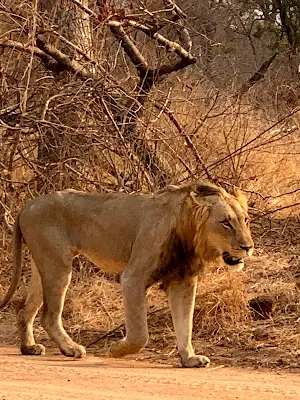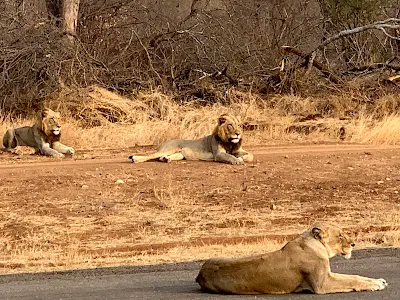People say rainy season is the best time for a safari vacation. Perhaps that’s true since the woodlands and the savannah would be lush green. But I am glad our trip was in the dry season. We saw up close and personal every single wildlife in the Big 5, the Magnificent 7, the Ugly 5 and everything in between, much of it around the water holes, some of it in the woodlands but none hidden by the lush greens of the bush.
Everyday single day, we spotted every member of the Big 5, and much action within this wildlife. A few vividly seared in memory.
The very first view as we entered the gates of the reserve, we saw a big herd of elephants cooling off by a pond. The herd must have included 20-25 elephants from large males to what might have been a few weeks old baby elephants. It appeared as if a large community of elephants was socializing and picnicking. As we drove on to our camp, we spotted many large herds of Nyala and Kudu all over the reserve. These large antelope type animals are very common to the Kruger area.
Everyday we saw pride of lions sunbathing often with young ones. Once we sighted a Cheetah resting presumably after eating its meal (we saw an animal carcass not too far away). Another time we saw a mama leopard with two cubs walking about and another time a young leopard resting in the grass. The most memorable sighting was of two leopards mating. They say opposable thumb, bipedal gait and the ability to talk is what differentiates humans from other animals. I say, it's the ability to kiss and be intimate is what sets us apart. Seeing two leopards mate in the open grasslands, there was no shame and no hiding, it was us humans that seemed embarrassed like teenage kids at the sight. I guess life in the wild is so precocious, one day you are hunting for meat and the next day you are the meat, that mating is a cause for celebration. It’s what creates the circle of life!
We saw herds of Wildbeast, Water Buffalo, Zebras, Giraffe. Several vulture sightings sitting on bare tree tops. Elephants were plentiful in herds small and large. Leaving their trail identifiable by large droppings and many a Marula tree whose bark was stripped and chewed. There was a time we saw a mama elephant with two younger elephants, truly those two younger ones were behaving like teenagers. One of the two teenage elephants bullying and pushing the other into water. The other resisting and pushing back. I thought of my own kids when one would push the other and the other would shout “mom, he’s hurting me”. I guess dealing with brats is no different in the elephant kingdom.
 While wild dogs are an endangered species, we saw them a couple of times. One of the most vivid memory is of two wild dogs who had chased a Kudu to a small island in a pond. The wild dogs tried swimming to the island, but retreated after only a few steps in the water. The two dogs circled and paced back and forth waiting for the Kudu to come ashore. The Kudu stood on this tiny island shaking with fear. Even from a distance, the shaking was very perceptible. The dogs waited for their kill for a long time. Us humans sitting at a distance watched this dance between the hunter and its prey like spectators. Finally, with the sun almost set, the dogs left their prey on the island. Wonder how long the Kudu stayed on the island, and whether it survived the night. The following day, when we drove past the spot, neither the Kudu nor the dogs were to be seen. How and if the young Kudu ever made it from the island is anyone’s guess. But, I guess the fear of death is universal. In the face of danger, life can do feats that are indefeasible. Regardless of whether you “fight or flight”, the death comes to all, it's just a matter of how each of us face the death in the end that matters.
While wild dogs are an endangered species, we saw them a couple of times. One of the most vivid memory is of two wild dogs who had chased a Kudu to a small island in a pond. The wild dogs tried swimming to the island, but retreated after only a few steps in the water. The two dogs circled and paced back and forth waiting for the Kudu to come ashore. The Kudu stood on this tiny island shaking with fear. Even from a distance, the shaking was very perceptible. The dogs waited for their kill for a long time. Us humans sitting at a distance watched this dance between the hunter and its prey like spectators. Finally, with the sun almost set, the dogs left their prey on the island. Wonder how long the Kudu stayed on the island, and whether it survived the night. The following day, when we drove past the spot, neither the Kudu nor the dogs were to be seen. How and if the young Kudu ever made it from the island is anyone’s guess. But, I guess the fear of death is universal. In the face of danger, life can do feats that are indefeasible. Regardless of whether you “fight or flight”, the death comes to all, it's just a matter of how each of us face the death in the end that matters.In the pond, rested the Hippos and crocodiles. Hippos visible mostly by their snout and hump. Once we caught a hippo at dawn walking into the water, as a couple of others lay basking on the muddy shore. We saw a young Giraffe spread its front legs wide as it bent to drink water. Just the act of preparing to drink water took hours. Walk then wait, walk some more then wait some more (making sure no danger lurked in or around the water source), the slow task of spreading the legs without toppling over and then bending the neck to drink water. No wonder Giraffe’s drink water once every few days. The danger to life is so great, that evolution has prepared their bodies to retain water for extended periods of time. Wonder if Darwin spent time in Africa before he wrote the theory of evolution. Survival of the fittest indeed.
Rhinoceros, a solitary animal. As huge as its body is, a Rhino travels vast areas every day. It marks its territory by its pee. When he pees, it seems as if a sprinkler has turned on.. imagine an animal walking and peeing at the same time, the pee spreading in a circle of approx 3-4 foot diameter. While our Land cruiser had stopped several yards away, apparently we were perceived within the Rhino’s personal space. A bull charged us. The tracker (spotter) shit scared reached for his knobkerry. The driver furiously backed the vehicle out of the danger zone. The bull stopped a few inches short of the spotter. Us passengers sighed in relief. Had the bull not stopped, the spotter would have been dead. He would have used the knobkerry to either make noise by banging on the hood of the cruiser or hit the Rhino on the head like a club. I doubt either would have made a difference, but probably would have given the driver a bit more time to back out of the danger zone and us into safety.
September 2, 2019, dawned the last day of our Safari trip, a day celebrated worldwide by Hindus as Ganesh Chaturthi. The moment we drove out of our camp, we ran into a large male elephant. Being old and large and slow, he lived a solitary life without the protection of a herd and stayed close to the camp. I had seen him and heard him often from our tent. This day, he was standing just a few feet from the dirt road. I saw he had one large, unbroken and yellowed tusk, the other tusk broken close to his mouth. I named him Ekdant (the one with a single tusk). As we paused close to him, he looked upon us, and bid us goodby with the following thought: “You must, for the good of the whole, live in herds but there comes a time in life when you must walk your own solitary path.”











